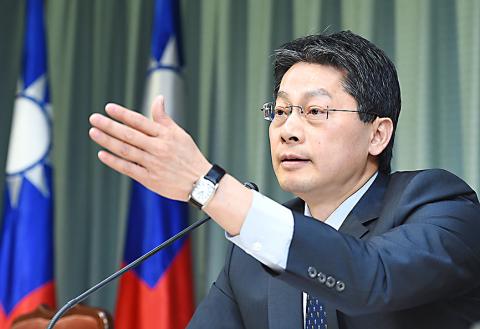About 10 critically ill refugees and asylum seekers being held on Nauru have received medical treatment in Taiwan since a memorandum of understanding (MOU) signed in September last year between Taiwan and Australia took effect in January, Ministry of Foreign Affairs spokesman Andrew Lee (李憲章) said in Taipei yesterday.
The Guardian on May 14 reported that an Iranian refugee who had been flown to Taiwan for critical heart surgery and her 17-year-old son were on May 10 taken back to Nauru by Australian Border Force officers “against psychiatric advice.”
Deputy Representative to the UK Cheng Shyang-yun (程祥雲) on May 18 wrote a letter to the newspaper saying that the refugees were not “forcibly returned” and that the patients had “completed their treatment prior to leaving Taiwan.”

Photo: Liao Chen-huei, Taipei Times
“In consideration of Taiwan’s high-quality medical facilities and long-standing medical cooperation with Nauru,” an MOU was signed allowing refugees and asylum seekers who require urgent medical treatment to be transferred to Taiwan, Cheng said.
The ministry last month also denied the allegations.
It confirmed that an MOU had been signed, adding that Taiwan Adventist Hospital has been overseeing the medical transfers since January.
On Friday, in an online article titled “Send them to Taiwan: Turnbull government’s secret refugee deal revealed,” the Sydney Morning Herald reported that the Australian government signed “an undisclosed arrangement aimed at stopping [refugees on Nauru] from applying to stay in Australia after being treated in local hospitals.”
“The [Australian] government has never announced the memorandum of understanding and refused to release it on Friday,” it said.
“Australia is understood to have sought assistance from more countries for medical transfers. But Taiwan is the only one that has signed a deal with the Turnbull government,” the paper added.
The Guardian on Saturday in an online article reported that asylum seekers who had been flown from Nauru to Taiwan have complained of language barriers.
It reported that the MOU was signed “in an effort to prevent people indefinitely detained on the island from applying for a medical transfer to Australia.”
Lee yesterday reiterated the terms of the MOU and Taiwan’s dedication to global health.
The WHO constitution clearly states that health is a basic human right, Lee said.
To respond to the WHO’s concept of universal health coverage, Taiwan, in addition to defending its citizens’ right to health, is devoted to boosting its contributions to global healthcare, he said.
Nauru is a diplomatic ally of Taiwan, Lee said, adding that medical cooperation with that country has been going on for years and has received praise.
The MOU clearly states that Taiwan and Australia should abide by international human rights standards, and ensure that those involved are treated with dignity and receive appropriate medical treatment, he added.

MAKING WAVES: China’s maritime militia could become a nontraditional threat in war, clogging up shipping lanes to prevent US or Japanese intervention, a report said About 1,900 Chinese ships flying flags of convenience and fishing vessels that participated in China’s military exercises around Taiwan last month and in January have been listed for monitoring, Coast Guard Administration (CGA) Deputy Director-General Hsieh Ching-chin (謝慶欽) said yesterday. Following amendments to the Commercial Port Act (商港法) and the Law of Ships (船舶法) last month, the CGA can designate possible berthing areas or deny ports of call for vessels suspected of loitering around areas where undersea cables can be accessed, Oceans Affairs Council Minister Kuan Bi-ling (管碧玲) said. The list of suspected ships, originally 300, had risen to about 1,900 as

Japan’s strategic alliance with the US would collapse if Tokyo were to turn away from a conflict in Taiwan, Japanese Prime Minister Sanae Takaichi said yesterday, but distanced herself from previous comments that suggested a possible military response in such an event. Takaichi expressed her latest views on a nationally broadcast TV program late on Monday, where an opposition party leader criticized her for igniting tensions with China with the earlier remarks. Ties between Japan and China have sunk to the worst level in years after Takaichi said in November that a hypothetical Chinese attack on Taiwan could bring about a Japanese

Right-wing political scientist Laura Fernandez on Sunday won Costa Rica’s presidential election by a landslide, after promising to crack down on rising violence linked to the cocaine trade. Fernandez’s nearest rival, economist Alvaro Ramos, conceded defeat as results showed the ruling party far exceeding the threshold of 40 percent needed to avoid a runoff. With 94 percent of polling stations counted, the political heir of outgoing Costa Rican President Rodrigo Chaves had captured 48.3 percent of the vote compared with Ramos’ 33.4 percent, the Supreme Electoral Tribunal said. As soon as the first results were announced, members of Fernandez’s Sovereign People’s Party

MORE RESPONSIBILITY: Draftees would be expected to fight alongside professional soldiers, likely requiring the transformation of some training brigades into combat units The armed forces are to start incorporating new conscripts into combined arms brigades this year to enhance combat readiness, the Executive Yuan’s latest policy report said. The new policy would affect Taiwanese men entering the military for their compulsory service, which was extended to one year under reforms by then-president Tsai Ing-wen (蔡英文) in 2022. The conscripts would be trained to operate machine guns, uncrewed aerial vehicles, anti-tank guided missile launchers and Stinger air defense systems, the report said, adding that the basic training would be lengthened to eight weeks. After basic training, conscripts would be sorted into infantry battalions that would take